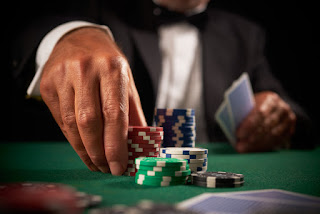 For many people, gambling is just a diversion. Unfortunately, like other addictions, it can quickly progress into a compulsion that robs people of their financial security and drastically changes their behavior, relationships, and priorities. In recent months, mental health professionals and scientists have begun classifying gambling as an addiction, placing it in the same category as drug and alcohol abuse.
For many people, gambling is just a diversion. Unfortunately, like other addictions, it can quickly progress into a compulsion that robs people of their financial security and drastically changes their behavior, relationships, and priorities. In recent months, mental health professionals and scientists have begun classifying gambling as an addiction, placing it in the same category as drug and alcohol abuse.Research indicates that gambling shares many diagnostic criteria with drug dependence, such as tolerance, withdrawal, and radical disruption of one’s life. Gamblers also report significant urges and cravings when they are unable to place a bet.
According to Jon Grant, addiction researcher at the University of Chicago, “People will get inured to the high of gambling at a certain point and need to gamble with bigger bets and riskier betting options. When people try to stop, they go through withdrawal, with insomnia, agitation, irritability, and a feeling of being ill at ease, similar to what we see in some substance abuse disorders.” Gambling problems also seem to run in families, alongside street drug, prescription drug, and alcohol addictions. So—if your family is prone to addictive behaviors, you may be driven to impulsivity and reward-seeking behaviors, too.
Symptoms of Gambling Addiction
If you’re not sure when betting for fun has turned the corner toward a gambling addiction, watch for these signs:
• Lying or being secretive about financial decisions
• Borrowing money from credit cards, banks, or family members
• Gambling when you cannot afford to make house or utility payments
• Always betting “more” to get a gambler’s high
• Experiencing depression & anxiety that results in sleep deprivation or health problems
• Exhibiting restless or irritable behavior when you can’t get your fix
• Returning to bet more in order to “chase a loss” from a previous day
• Prioritizing gambling over eating, sleeping, or socializing
When study participants watch videos depicting gambling, or participate in virtual gambling games during brain scans, there are changes in blood flow to certain areas of the brain. Gambling has thus been reclassified as a behavioral addiction because these imaging studies show that the brain’s reward system “lights up” during gambling just as it does during substance use. These types of studies tell us that behaviors can impact the brain just as powerfully as chemicals—and that it is important to seek help before any type of addictive behavior takes over your personal life, relational connections, and financial well-being.







